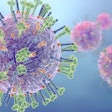
Single-cell RNA sequencing has revealed the factors that cause responses to SARS-CoV-2 to vary between individuals and populations in a recently published study.
In the early weeks of the COVID-19 crisis, it became clear that people can respond very differently to the virus. People of similar age and health status can have dramatically different outcomes after infection, with one person becoming sick enough to be hospitalized while the other shows no symptoms. Evidence of the genetic and immunological basis for person-to-person differences is now available.
The single-cell RNA sequencing study, details of which were published in Nature, tackled the variability of responses to the virus from a different angle. Rather than focus on differences between individuals, the team of researchers based in France, China, and Hong Kong looked at population-level variation.
To assess population-level variation, the researchers performed single-cell RNA sequencing on peripheral blood mononuclear cells taken from 222 healthy donors of diverse ancestries. Stimulating the cells with SARS-CoV-2 showed how responses to the virus vary between different populations.
“Cell type composition is a major driver of population differences in immune responses to SARS-CoV-2,” the authors wrote. “The higher proportions of memory cells in lymphoid lineages from individuals of African descent, along with their association with cytomegalovirus (CMV) infection, highlight how previous environmental exposures can contribute to population disparities in cellular activation states.”
The study linked latent CMV infection and related changes in cell abundance, such as increased lymphoid differentiation, to population-level differences in transcriptional responses to the pathogen. More work is needed to understand the impact of other exposures on population variation.
Common genetic variants can also contribute to differences in immune responses. The study linked one variant to a 2.8-fold increase in the expression of a gene that suppresses innate immunity in response to viral stimulation in Europeans compared with in Africans.



















